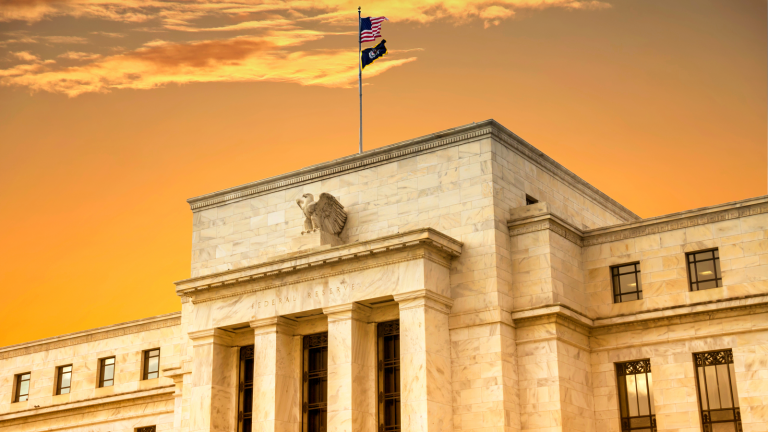The Wall Street Journal recently reported that Donald Trump’s political team has crafted a secretive plan to grant him significant influence over the Federal Reserve. The plan proposed making Trump an “acting” board member, allowing consultation on interest rates if he were re-elected. The plan also aimed to use the Treasury Department to oversee the Fed’s bond-buying.
The draft suggested Trump could dismiss Fed Chair Jerome Powell and align Fed policy with administration goals. Investors may remember that Trump previously criticized Powell while in office and reportedly considered his removal. Trump’s campaign officials downplayed the draft’s significance, but the extent of the president’s authority over the Fed remains uncertain.
Trump’s Influence on Fed Reversals
Trump’s allies are reportedly drafting proposals to reduce the Federal Reserve’s independence if he returns to the White House. The plan aims to install loyalists at the central bank. Under this plan, the Fed, which manages monetary policy and regulates banks, would face constraints. The focus would be appointing policymakers loyal to Trump rather than maintaining the Fed’s independence.
The Journal reported that the proposals would grant Trump influence over interest-rate decisions and the power to remove Fed Chair Jerome Powell before his term’s end in 2026. Trump’s advisors clarified that these plans were only official if announced by Trump or his authorized team.
The proposal aims to subject the Fed to the Office of Management and Budget review for new rules, diminishing its independence in banking regulation. The Federal Open Market Committee raised rates 11 times from March 2022, pausing in September, with Powell emphasizing the need for economic data confidence before any rate cuts.
Trump on Plans of Removing Current Fed Chair
In February, Trump criticized Fed Chair Jerome Powell on Fox News, suggesting he might lower interest rates to aid Democrats. Trump nominated Powell in 2017.
The former president, now running for re-election, frequently criticized Powell for raising interest rates. Since 2021, the Fed has raised rates 11 times to combat inflation. On January 31, the Fed kept the key interest rate at 5.4%, a 22-year high, but hinted at possible cuts.
Consumer prices rose 3.4% in December compared to the previous year, which is still above the Fed’s 2% target. Trump criticized Powell for not controlling inflation, warning of potential spikes if rates were cut. He cited geopolitical tensions in the Middle East as a critical factor.
In January, Trump also expressed his hopes of an economic crash before he resumes office. During his speech, he referenced Herbert Hoover’s presidency during the Great Depression. Moreover, the former president gave himself the credit as to why the stock market is booming, suggesting investors should also show confidence in him this election.
In December 2023, Powell addressed a question at a news conference, asserting that political events do not influence the Fed’s decisions. He emphasized the importance of prioritizing the economy over politics. The Fed’s website underscores its apolitical stance, citing better economic outcomes in countries with independent central banks. Trump, however, mentioned having replacements for Powell, whose term extends into May 2026, amid legal uncertainties about early dismissal.
Due to the Fed’s institutional independence, Trump couldn’t unilaterally change monetary policy by firing or replacing Powell. The Fed’s decisions require approval from the Board of Governors, limiting the impact of potential Trump nominees. Bessent, a Trump donor, emphasized that Trump’s team valued the Fed’s credibility as a crucial anchor for medium and long-term rates.
No Signed Policy Plans Yet
Donald Trump’s economic advisers disagree over policy ideas for his potential second term, leading to public disputes. Suggestions include penalizing countries moving from the U.S. dollar and altering the Federal Reserve for more presidential control. However, Trump hasn’t approved any, causing frustration among his campaign team.
The flood of economic proposals has irked top Trump campaign officials and created distractions during preparations for the general election. The economic ideas add further complications with Trump’s involvement in an ongoing criminal trial and the campaign’s focus on winning swing states and fundraising. It’s akin to the past strategy of officials seeking TV appearances to influence Trump’s viewpoints.
In his first term, Trump frequently pushed for low-interest rates, sparking debates among Republicans about the Fed’s power. Nathan Sheets of Citigroup (NYSE:C) questions whether Trump, in a second term, would choose to maintain the Fed’s independence.
An expert warned that efforts to undermine the Fed’s independence could lead to market backlash and increased volatility. Previous presidents like Nixon and Reagan attempted to influence the Fed with rate cuts, often resulting in economic challenges. Potential costs would likely outweigh any gains from such actions.
Changes Will Only Be Possible if Trump Is Successfully Re-Elected
Trump has easily dominated the GOP primary against its major rivals like Nikki Haley and Ron DeSantis. Some polls also favor Trump over Biden, but the race heats up with other third-party candidates like Robert F. Kennedy Jr. However, Trump still gains more attention from young and new voters than his previous race with Biden.
However, a challenge remains: Younger voters historically show lower turnout, and GOP-led states have passed laws limiting acceptable voter IDs, potentially reducing youth participation. Trump also faces legal issues, including a New York hush-money case and a Supreme Court appeal for presidential immunity.
On the date of publication, Chris MacDonald did not hold (either directly or indirectly) any positions in the securities mentioned in this article. The opinions expressed in this article are those of the writer, subject to the InvestorPlace.com Publishing Guidelines.

